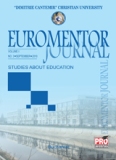THE CONCEPT OF INCARNATION IN PHILOSOPHICAL AND RELIGIOUS TRADITIONS
THE CONCEPT OF INCARNATION IN PHILOSOPHICAL AND RELIGIOUS TRADITIONS
Author(s): Alexandru Gabriel NegoițăSubject(s): Ancient Philosphy, Philosophy of Religion, Biblical studies, Eastern Orthodoxy, Sociology of Religion, History of Religion
Published by: Editura Pro Universitaria
Keywords: Incarnation; Assumption of Humanity; Human Indignity; Logos;
Summary/Abstract: Incarnation, as defined in its simplistic form, in which God assumes a human nature, is at the heart of Christian doctrine. The uniqueness of the Incarnation, in Christian doctrine as opposed to other religious traditions, is incorporated into and among other Bible texts and into the Gospel according to John 1:1–18. This article will discuss some of the philosophies that existed at the time, which supposedly influenced the Gospel of Saint John. Thus, we will try to understand how some of these philosophies interpret incarnation in forms that do not necessarily reflect incarnation as is traditionally understood in Christianity (where God becomes flesh). This article opted for a special structure of consolidation, primarily from the belief that the Gospel of John differs from historical and contemporary philosophical tradition to the time it was written and therefore begins with the removal of Gnostic philosophies and teachings that have been assimilated in the Gospel of John. This indicated the independence and uniqueness of the writing of the evangelist John. The article also provides a list of fundamental beliefs by Christians of incarnate logos also supported by some historians the first and second century. These beliefs are then compared to concepts such as theophany, apotheosis, theosis, deification, canonization, anthropomorphism, to which Huxley is alluded to, as being equated with logos.
Journal: Euromentor Journal - Studies about education
- Issue Year: XI/2020
- Issue No: 4
- Page Range: 28-37
- Page Count: 10
- Language: English

